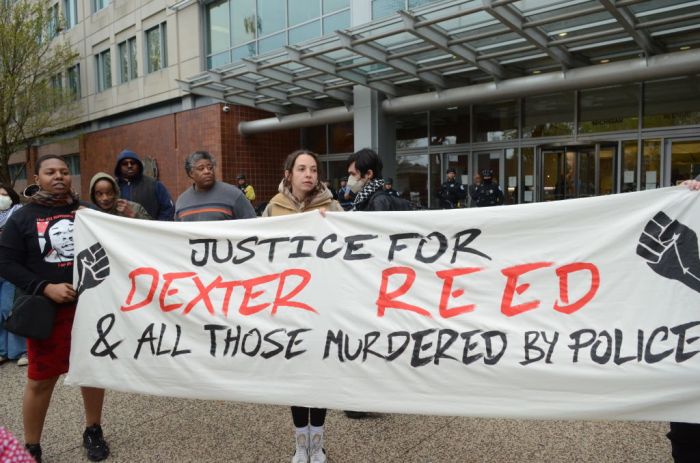On March 21, 2024, Dexter Reed, a 26-year-old Black man, became yet another name on the long list of those fatally shot by police.
Source: Anadolu / Getty
As BOSSIP previously reported, during a traffic stop on Chicago’s West Side for a seatbelt violation—police shot at Reed 96 times. Now, the Cook County Medical Examiner’s office ruled Reed’s death a homicide, and the family has filed a federal lawsuit for one of this year’s most shocking cases of police violence.
The bodycam footage from the incident does nothing but raise more questions. Released to the public, the video captures the harrowing moments of the shootout, where it seems Reed may have fired first.
Yet, the disproportionate response—a barrage totaling a staggering 96 bullets fired at his vehicle in just 41 seconds—drew major criticism as excessive and reckless.
A Family’s Grief Turns to Action
The Reed family has channeled their grief into demands for justice. As ABC7 shares, the Reed’s have filed a federal civil rights lawsuit against the city and the five officers involved, accusing them of brutal, militarized policing tactics that they claim led directly to Dexter’s untimely death.
The lawsuit raises crucial questions about the legitimacy of the traffic stop. Given Reed’s car had dark-tinted windows, how could officers even see whether he wore a seatbelt?
According to some social media users, this was a typical occurrence in that community: unlawful traffic stops.
Moreover, the Reed family contends that Dexter’s diagnosed PTSD should have prompted a more measured approach from the police.
During a press conference, family members described the use of force as akin to an execution. They painted a picture of a man confused and panicking at the sudden escalation before a firing squad.
See the lawsuit press conference, here:
Public Outcry and Institutional Response
The fallout from Dexter Reed’s shooting has been significant. The Civilian Office of Police Accountability (COPA) voiced “grave concerns” over the officers’ judgment regarding the use of deadly force.
All five officers involved have been placed on a 30-day administrative leave pending further investigation by COPA and the Cook County State’s Attorney’s Office.
Public reaction has been fierce, with activists and community leaders calling for substantive changes to police protocols, particularly questioning the role of plainclothes officers in routine traffic stops.
The Reed family, along with their legal representation, have urged the city to disband the tactical unit involved. They cite a pattern of aggressive behavior disproportionately targeting young Black men in low-income neighborhoods.
The Path Forward: Calls for Change and Reflection

Source: Anadolu / Getty
As the city of Chicago grapples with the implications of this case, the Reed family’s federal lawsuit emphasizes not just the actions of the individual officers. It also challenges the systemic failures that allow such tragedies to occur.
They argue that the city’s lack of compliance with federal consent decrees and ongoing policy failures contribute to a culture of impunity within the police force.
As this case unfolds, it highlights the urgent need for reforming police tactics and addressing officers’ racial biases.
The community’s call to action is clear: this must not happen again. With the nation watching, Chicago faces a turning point that will redefine law enforcement and community safety.





